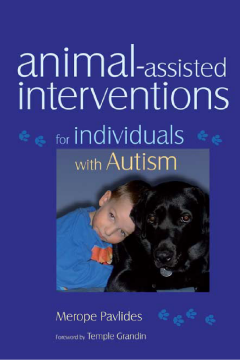
BOOK
Animal-assisted Interventions for Individuals with Autism
Temple Grandin | Merope Pavlides
(2008)
Additional Information
Book Details
Abstract
This book looks at how therapies involving animals can be used to help individuals with autism to develop skills, including sensory and social skills, to manage challenging behaviors, and improve quality of life.
Whether participating in therapeutic horseback riding, utilizing a trained service dog, visiting a dolphin therapy center, or simply experiencing companion animal therapy, people with autism can reap a multitude of benefits from interaction with furry, feathered, and finned friends. Merope Pavlides relates the success stories of different animal-assisted interventions, as well as noting the challenges of working with particular animal species. She also emphasizes the importance of tailoring interventions to the specific needs of the individual and of monitoring progress.
With recommendations for resources and further reading, this book will be of great interest to people with autism, their parents, and the professionals who work with them.
A well-written book that is well researched and addresses my interests and concerns as a psychologist new to the area of animal-assisted interventions
PsycCritiques
Did you know that dogs may be trained to help children with autism? I didn't until I read this fascinating book. The book contains many heart warming case studies describing how the child's quality of life has been improved through their interaction with animals. So read, enjoy and be inspired.
NAPLIC
Merope Pavlides is a certified pet dog trainer specializing in work with special needs families, and has taught therapeutic horseback riding. One of her own sons has autism, the other has dyslexia and a central auditory processing disorder. Merope has an MS in special education from Johns Hopkins University with a graduate certificate in teaching children with autism and pervasive developmental disorders. She lives in Maryland, USA.
The book provides practical advice for families considering a service dog. It highlights funding issues, problems faced by families aaand professionals, and makes reference to the problems and benefits of using animals in the community. I found this book fascinating and inspiring. Families and professionals can benefit from reading this book and adapt many of the ideas and perhaps inspire more people to use animals to provide opportunities to assist with communication, independence, relaxation, sensory exploration and emotional support.
PMLD - Link Journal
…[E]ssential reading for families, teachers, and anyone who is interested in using service animals to help individuals on the autism spectrum
from the foreword by Temple Grandin
This book looks at how therapies involving animals can be used to help individuals with autism to develop skill, including sensory and social skills, to manage challenging behaviors,and improve quality of life.
Whether participating in therapeutic horseback riding,utilizing a trained service dog, visiting a dolphin therapy center, or simply experiencing companion animal therapy, people with autism can reap a multitude of beneifits from interaction with furry, feathered, and finned friends.
With recommendations for resources and further reading, this book wull be of great interest to people with autism, their parents, and the professionals who work with them.
Autism Us
Table of Contents
| Section Title | Page | Action | Price |
|---|---|---|---|
| Figures, tables, boxes and stories | |||
| Acronyms | |||
| Foreword | |||
| Foreword: implications of the COVID-19 pandemic | |||
| Editors’ preface | |||
| Acknowledgements | |||
| Introduction | |||
| 1. The global housing finance challenge for the underserved by Marja C. Hoek-Smit | |||
| 2. The housing finance ecosystem for the world’s poor by Daniel Rozas and Patrick McAllister | |||
| 3. Do-it-yourself housing by Stuart Rutherford | |||
| 4. Housing microfinance by Sandra Prieto and Patrick Kelley | |||
| 5. The funding landscape for affordable housing finance by Deborah Burand, Claudia Rojas, R.V. Verma, W. Britt Gwinner, Lucie Astier Such, Vinod Kothari, and Mona Kachhwaha | |||
| Conclusion by Patrick McAllister and Daniel Rozas | |||
| Index |
